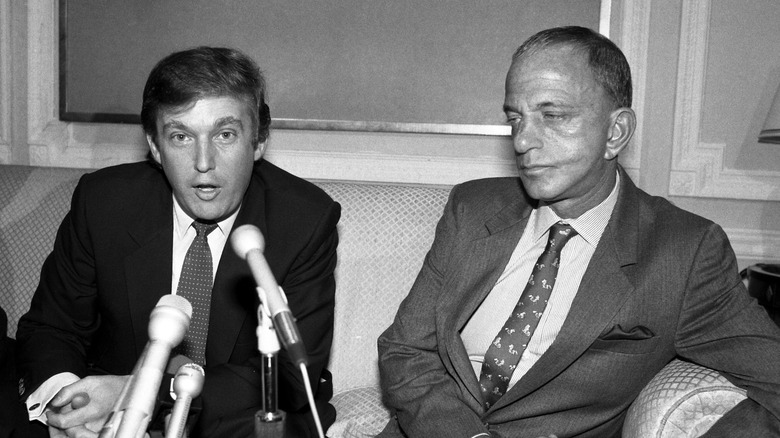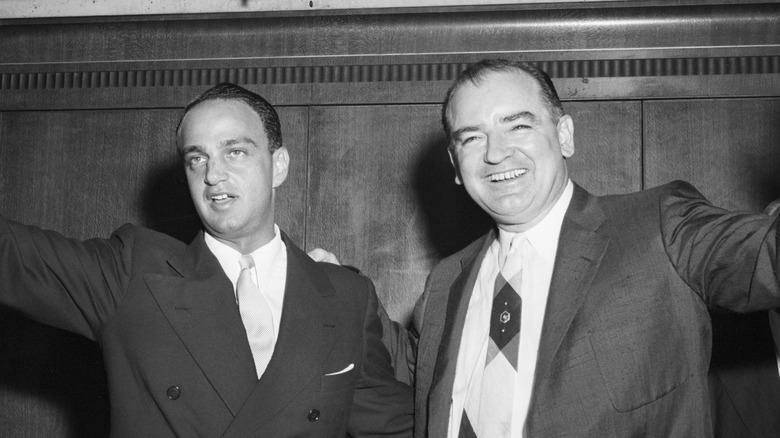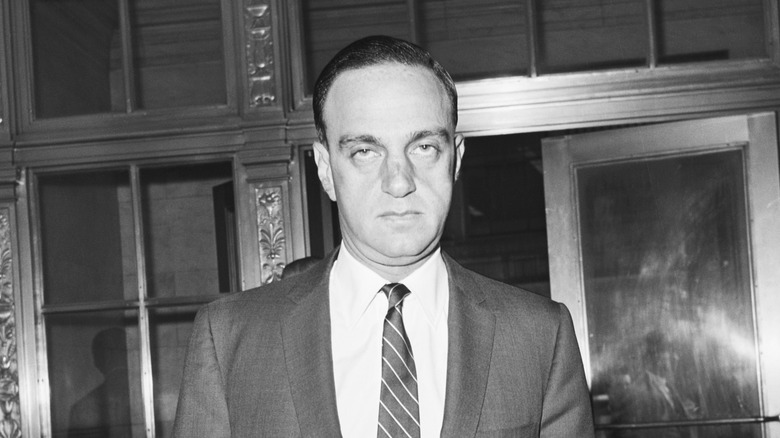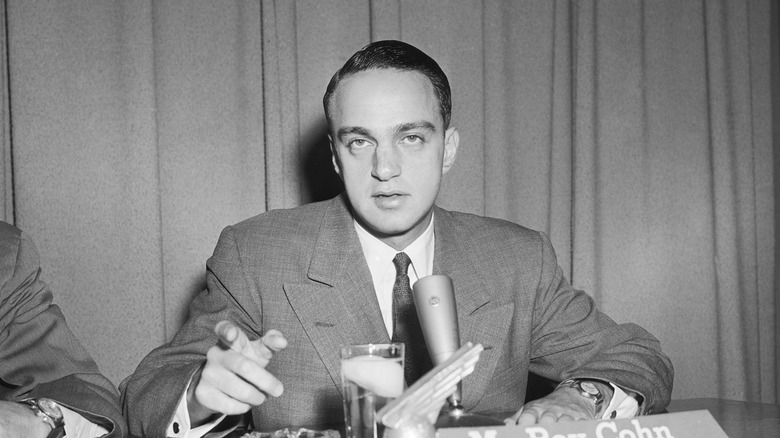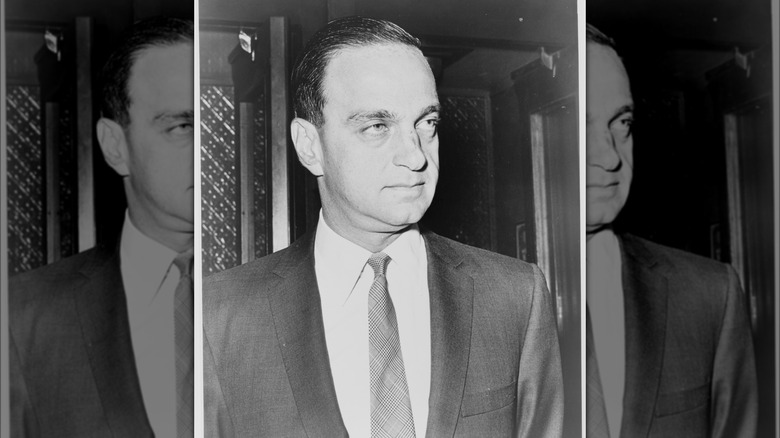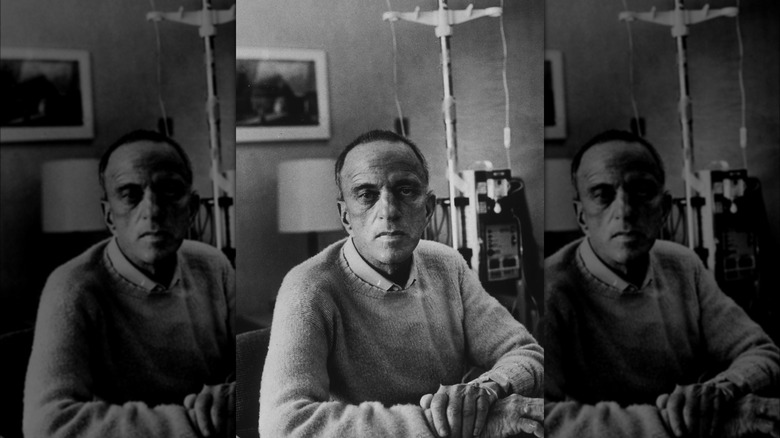Why Donald Trump's Late Lawyer Roy Cohn Was So Controversial
Donald Trump has had a handful of lawyers over the years. From Michael Cohen to Alina Habba; it can sometimes be hard to keep up with who's on his legal team. However, long before Cohen, Habba, and many of his other lawyers, Roy Cohn was part of the former U.S. president's OG legal team. And it may or may not be surprising that he was just as controversial as Trump.
Matt Tyrnauer, the director of "Where's My Roy Cohn?," a documentary on Cohn's life, told Esquire that Cohn and Trump became acquaintances in the early '70s. Tyrnauer explained that the lawyer was a major mentor for the businessman and saw a lot of potential in Trump. The director shared, "In one incredible piece of footage from the late '70s he [Cohn] says that Trump's a meteor rising from New York that's going to go on to touch every part of the country and part of the world." Cohn's statement is a bit eerie, seeing as Trump went on to become the U.S. president, and became known all across the globe.
Although his name became synonymous with Trump, Cohn's career was more than just what he did for the then-future president. From being Studio 54's go-to lawyer to defending high-profile clients like New York Yankees owner George Steinbrenner, Cohn was well-known in the legal world. But as impressive as his career may have seemed, the lawyer's life was filled with tons of controversy that followed him up until his death.
Many saw Roy Cohn as a hypocrite
One of Roy Cohn's major controversies was his involvement in the Lavender Scare of the 1950s. For those unfamiliar with the Lavender Scare, it was a policy against the gay community, claiming that those who identified as a homosexual were potential threats in government positions because they were allegedly more susceptible to being scammed out of information. Senator Joseph McCarthy, J. Edgar Hoover, and yes, Cohn led this movement. The three of these men were responsible for the firing of hundreds of individuals.
In total, the State Department fired 425 individuals who were accused of being gay. The discrimination against the LGBTQ+ community was controversial on its own, but Cohn specifically received heat for his role in the firings because of his own sexuality.
For years, Cohn was accused of being gay, but never admitted it. However, many of the lawyer's partners have come forward about their relationship with the big shot. Wallace Adams, one of Cohn's boyfriends, told Matt Tyrnauer, the director of "Where's My Roy Cohn?" (via Politico), "Even at the end, he refused to admit that he was gay." Many close to the lawyer knew about his romantic life, but Cohn seemed to keep it extremely under wraps. His lies continued, as he denied having AIDS, which really killed the lawyer, instead of the liver cancer he claimed to have. Still, many can't wrap their heads around the fact that the businessman persecuted the LGBTQ+ community, despite the knowledge that he was gay.
Roy Cohn was indicted three times
Just because he was a lawyer doesn't mean that Roy Cohn was a stand up guy. Between the '60s and '70s, Cohn was indicted a whopping four times. From extortion to bribery, the lawyer was accused of awful business practices, and with the repeated pattern, many felt them to be true. Still, Cohn never faced legal trouble for these indictments, and got off easy for these serious crimes, being acquitted three times with the fourth being deemed a mistrial.
In 1969, when Cohn faced charges of bribery, extortion, blackmail and conspiracy, he represented himself in the closing arguments after his lawyer suffered a health issue, which many believed was an excuse for him to speak in court. Author Ken Auletta told Esquire in 1978 (via the Independent), "It tells you something about Roy's Machiavellian reputation that there are those who believe the heart attack was feigned so Roy could offer his own summation." Auletta explained that this gave the famous lawyer the opportunity to speak to the jury without being cross-examined; a smart but controversial tactic. He shared that Cohn gripped the courtroom from the moment he spoke, saying, "For two days, without a note, Roy delivered an eloquent seven-hour summation, ending with a protestation of love for America. Tears streamed down Roy's and the jurors' cheeks."
As we previously mentioned, Cohn was acquitted in this case and two more. The lawyer clearly had a way of charming people, but his shady business doings would eventually catch up to him.
Roy Cohn was disbarred for shady business
In 1986, Roy Cohn was disbarred by the Supreme Court in Manhattan, New York. The reasons for his disbarment included "dishonesty, fraud, deceit and misrepresentation" in his practice. According to the Washington Post, the lawyer had one of his millionaire clients, Lewis Rosenstiel, sign a document naming him as a trustee. This would have been fine if Rosenstiel was aware of what he was doing, but the millionaire was anything but in the right state of mind. He was on medication, as he was on his deathbed, and not only that, but Cohn lied to him and told him the documents had to do with his divorce, not his trust.
Rosenstiel's situation wasn't the only reason Cohn was disbarred. According to the Washington Post, "Cohn refused to repay a $100,000 loan from a client and lied about it in court; violated an escrow order, allowing dissipation of a corporation's assets in a securities-fraud case, and concealed pending disciplinary proceedings on an admission application to the District of Columbia Bar." All of the lawyer's shady business caught up to him, and he was formally disbarred.
Cohn never saw the case against him as something with proper substance. He told the Los Angeles Times, "It's composed of a bunch of Cohn-haters. Their idea of hearings is to hear their side only and not our side." Regardless of his thoughts, the evidence suggested otherwise, and in the end, he lost his license to practice law.
Roy Cohn was accused of arson and a potential murder
Roy Cohn was a powerful lawyer and was known for using controversial tactics to get his clients, and himself, the best outcome. So, when Cohn's yacht mysteriously caught fire, many wondered if there were ulterior motives.
In 1974, Gannett News Service reported that Cohn was being investigated by the Federal Bureau of Investigation for a 1973 boating incident. The lawyer's yacht, named the Defiance, caught fire not long after setting sail and resulted in the death of crew member Charles Mortonson. According to the newspaper, Cohn denied owning the boat, and tried to pretend that the scandal never happened, despite him being the one who requested for it to set sail from Florida to New York. Tips to officials launched the investigation into the incident, and whether it was something so much more. Initially, thoughts were that there were narcotics on board, but the reason for the boating incident drastically changed over the years.
Cohn was accused by many, including Mortonson's father, of purposely setting his boat on fire to collect the insurance on the asset. After the incident, the lawyer obtained $30,000 for insurance on the boat. Cohn received a hefty payout from the tragic incident, and knowing all the shady things he did in his career, many didn't put it past him that he would go to these extreme lengths to collect the cash.
Roy Cohn refused to pay taxes
In his book "How To Stand Up For Your Rights and Win" (via Politico), Roy Cohn shared that he did not pay taxes and believed the money went to "welfare recipients," "political hacks," "bloated bureaucrats," and "countries whose people hate our guts." It was no secret that Cohn hated the IRS, and everything about them, so to fight back he would refuse to pay his owed taxes.
Of course, Cohn couldn't completely get away without paying the government the money he owed. In 1986, the IRS sued Cohn for $7 million in owed taxes and penalties associated with that. The IRS was looking to take the businessman's townhouse and home in New York and Connecticut. It's unclear what happened with this lawsuit, but Cohn was poorer than you may have thought leading up to his death. His friend, Roger Stone, told The New Yorker, "He [Cohn] told me his absolute goal was to die completely broke and owing millions to the IRS. He succeeded in that." Cohn's attitude toward taxes was controversial, as many wondered how he could live such a lavish life, and still get away with owing the government millions of dollars.

